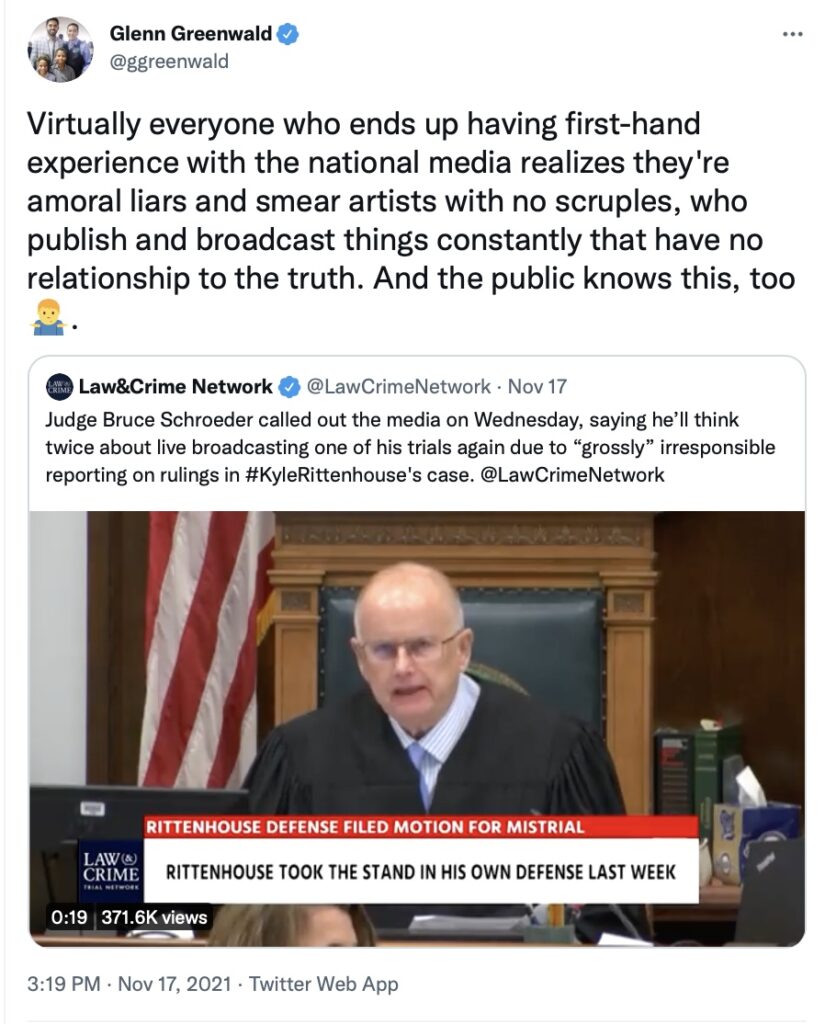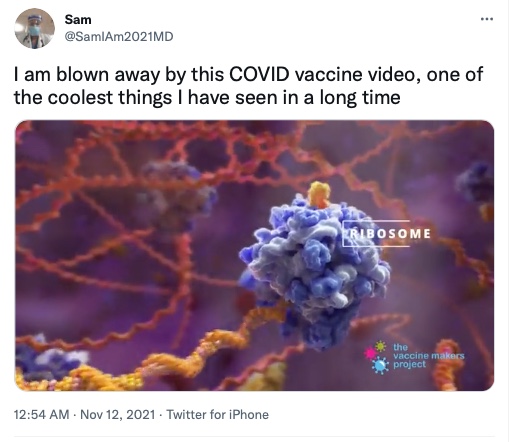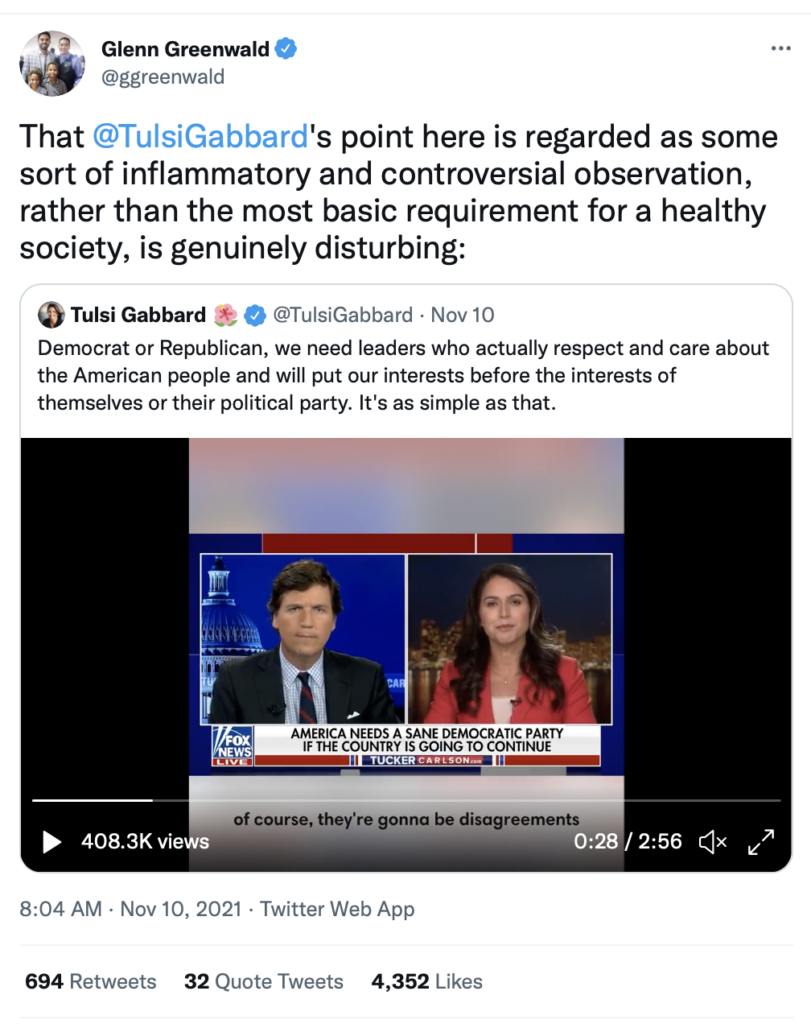Andrew Sullivan offers a long litany of stories that the left-leaning legacy media got extremely wrong. So incredibly wrong that it reveals more than journalistic malpractice. It reveals a news media industry that treats its readers like children who it thinks are incapable of making good decisions based on complex real life evidence. It's a new media that systematically makes shit up and hides stories that run counter to its narrative, its mission, which on the left side of the news media is to elect Democrats. It is the mirror image of FOX on the right. Both of these news "teams" violate many of the journalism rules of ethics promulgated by the Society of Professional Journalists. For instance,
– Take responsibility for the accuracy of their work. Verify information before releasing it. Use original sources whenever possible.
– Provide context. Take special care not to misrepresent or oversimplify in promoting, previewing or summarizing a story.
– Avoid undercover or other surreptitious methods of gathering information unless traditional, open methods will not yield information vital to the public.
– Be vigilant and courageous about holding those with power accountable. Give voice to the voiceless.
– Support the open and civil exchange of views, even views they find repugnant.
– Recognize a special obligation to serve as watchdogs over public affairs and government. Seek to ensure that the public’s business is conducted in the open, and that public records are open to all.
On the Democrat news media, recently concocted stories described by Sullivan involve:
Kyle Rittenhouse:
Money quote from the defense lawyer: “It wasn’t until you pointed your gun at him, advanced on him, with your gun (and your hands down) pointed at him, that he fired? Right?” To which Grosskreutz answered: “Correct.” Here’s how the NYT first described this a year ago, on August 26: “Video footage from the scene of the shooting appears to show Mr. Rittenhouse running and then firing his gun, striking a man in the head. He then flees and is chased by bystanders before tripping, falling to the ground and shooting another man.”
Here are many examples of how the news media are intentionally (or at least recklessly) misunderstanding the rule of law and our system of justice relevant to Rittenhouse. One of the favorite tactics of Democrat media is to mention that Rittenhouse is "white" (how is this relevant?) while failing to mention that the three people he shot are also "white" (what's good for the goose . . . ) (See here and here). You might rightly think that the news media is revving up conflict pornography (stoking race conflict) in order to sell advertisements.
Other recent wretched excuses for journalism include:
Almost everything reported on the left about Trump and Russia, Rachel Maddow doing disgraceful reporting on this topic for years - See here and here.
Claims about the Covington Boys;
Claims that there were bounties on U.S. Soldiers;
Claims that the Lab-Leak origin of COVID was a conspiracy theory;
Claims regarding the motives of the Pulse Mass Shooting and the Atlanta spa shooter;
Claims that attacks on Asian-Americans were by "white supremacists," when they were "disproportionately by African Americans and the mentally ill;
The claim that Officer Sicknick's skull was savagely bashed in with a fire extinguisher by a pro-Trump mob until he died;
The claim that a laptop was not property of Hunter Biden but, rather, it was Russian disinformation;
The claim that inflation was not increasing dramatically;
The claim that vaccines would end the pandemic;
The claims that critical race theory isn't in high schools and grade schools when CRT teachings are being pushed in hundreds of schools and school districts.
I could add a few things. For instance, from the NYT/NPR/WP center of the news universe we heard almost nothing about extensive nightly riots and looting in the wake of George Floyd's killing. Rather, we were told about the "mostly peaceful protests." More specifically, it was as though Seattle CHAZ/CHOP and Portland Oregon didn't exist.
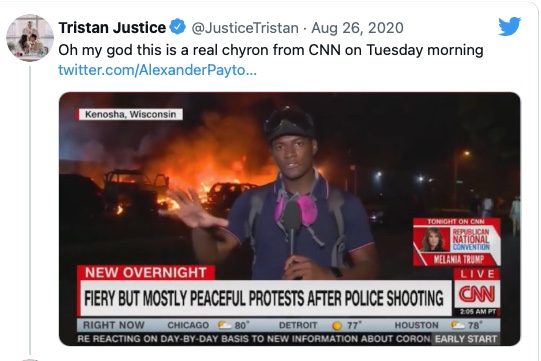
How do media outlets get away with these lies and corruption? Here's my simplistic answer:
Brandolini's law, also known as the bullshit asymmetry principle, is an internet adage which emphasizes the difficulty of debunking false, facetious, or otherwise misleading information: "The amount of energy needed to refute bullshit is an order of magnitude larger than to produce it."
Andrew Sullivan's article is titled: "When All The Media Narratives Collapse: In case after case, the US MSM just keeps getting it wrong." As Sullivan notes, all of these false stories he listed favored Democrats.
Sullivan, sounding demoralize, concludes:
And at some point, you wonder: what narrative are they pushing now that is also bullshit? One comes to mind: the assurance that the insane amount of debt we have incurred this century is absolutely nothing to be concerned about because interest rates are super-low and borrowing more and more now is a no-brainer. But when inflation spikes and sets off a potential spiral in wages to catch up, will interest rates stay so quiescent? And if interest rates go up, how will we service the debt so easily?
I still rely on the MSM for so much. I still read the NYT first thing in the morning. I don’t want to feel as if everything I read is basically tilted through wish-fulfillment, narrative-proving, and ideology. But with this kind of record, how can I not?
We need facts and objectivity more than ever. Trump showed that. What we got in the MSM was an over-reaction, a reflexive overreach to make the news fit the broader political fight. This is humanly understandable. It is professionally unacceptable. And someone has got to stop it.
Here's the "news media" getting it extremely wrong once again, a few days ago, on the Rittenhouse case, on of the ubiquitous intentional/reckless articles we are seeing from the Official Democrat News Media:
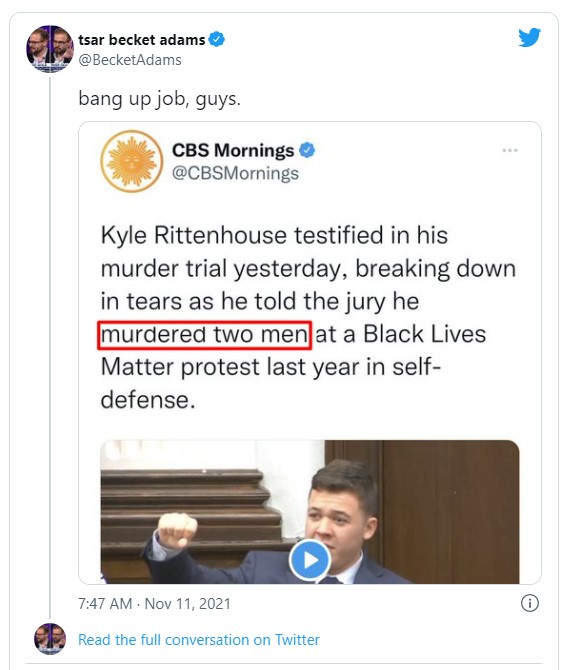
The NYP quotes Andrew Sullivan:
Some mistakes are natural, but “when the sources of news keep getting things wrong, and all the errors lie in the exact same direction, and they are reluctant to acknowledge error, we have a problem,” warns Andrew Sullivan at his Substack. Agenda-driven reporting on the Kenosha shootings “effectively excluded the possibility that [Kyle] Rittenhouse was a naive, dangerous fool . . . who, in the end, shot assailants in self-defense,” so testimony that he did just that “came as a shock.”
Bonus Evidence: When Barack Obama visited Mount Rushmore, CNN described Obama's visit:
“Obama arrived there late last night and got a good look around Mount Rushmore — it’s quite a sight if you haven’t seen it,” said CNN anchor Rob Marciano.
“Barack Obama is in South Dakota today. He arrived there last night. Take a look at this. He got a good glimpse of the majestic Mount Rushmore,” fellow CNN anchor Betty Nguyen said later in the same broadcast.
A few days later, CNN’s Jim Acosta described Obama’s visit to Mount Rushmore like this: “It’s a fitting campaign stop for a presidential contender looking to make history. Standing before Mount Rushmore over the weekend, Barack Obama was asked whether he sees his face joining the likes of Washington and Lincoln.”
When Donald Trump visited Mount Rushmore, CNN had this to say:
“President Trump will be at Mt. Rushmore where he’ll be standing in front of a monument of two slave owners and on land wrestled away from Native Americans told that [they are] focusing on the effort to, quote, tear down our country’s history,” reported CNN Leyla Santiago on The Lead with Jake Tapper.
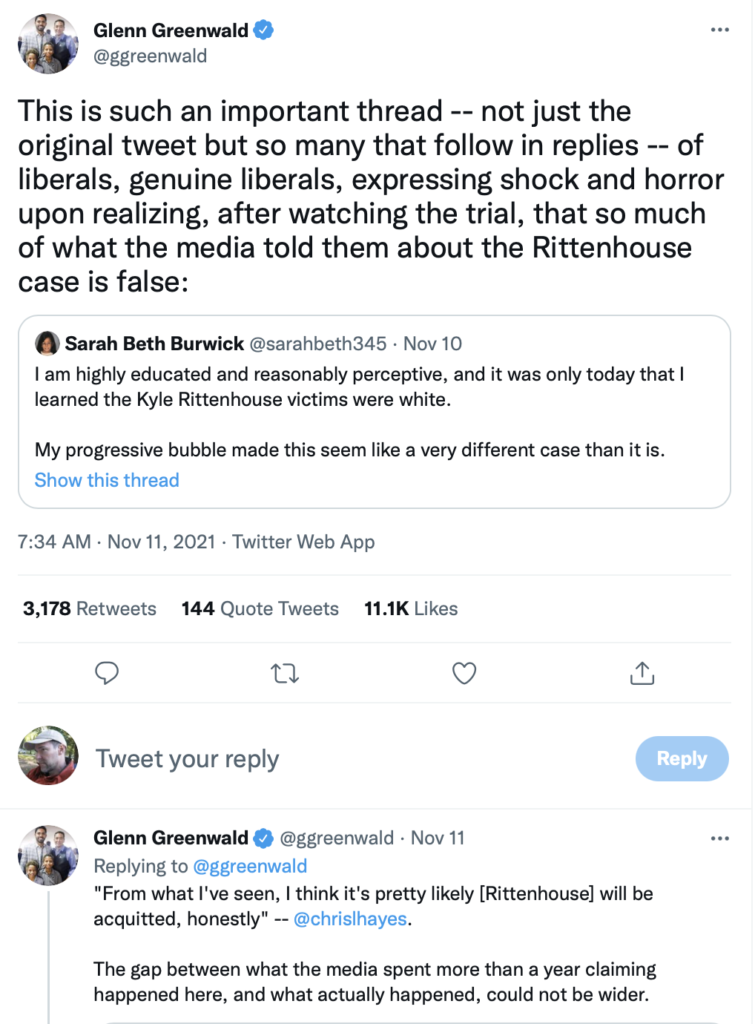
Last year I would have thought that Glenn Greenwald's rhetoric (below) was over the top, shrill, hyperbole. No longer. I'm there too after seeing the unending flow of false news--fake news--from the left.
Virtually everyone who ends up having first-hand experience with the national media realizes they're amoral liars and smear artists with no scruples, who publish and broadcast things constantly that have no relationship to the truth. And the public knows this, too
On the national level, many news outlets that I formerly trusted no longer deserved any trust. I trust no outlet, whether it be FOX or any of the "good guys" on the political left, who have abandoned all of the principles they were ever taught in J school and now see themselves as servants of their favorite political party.
